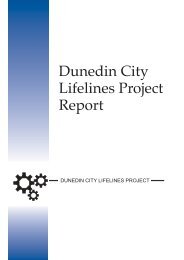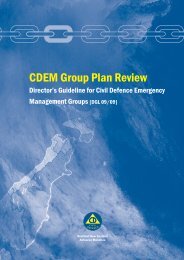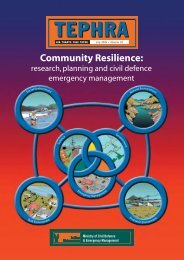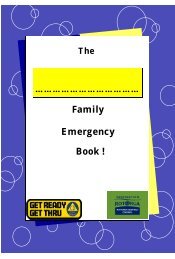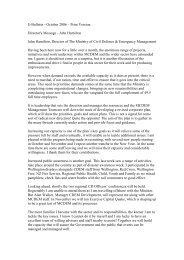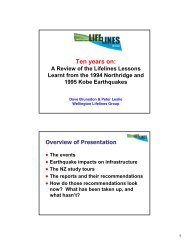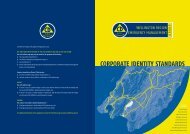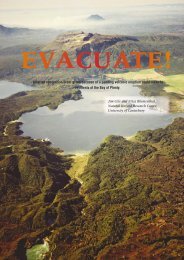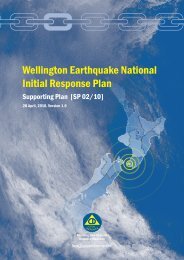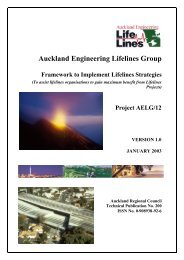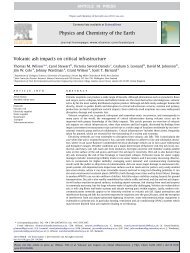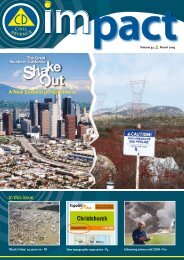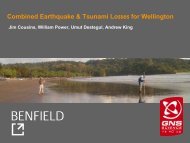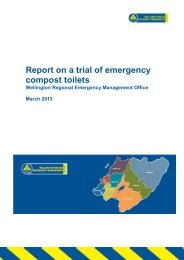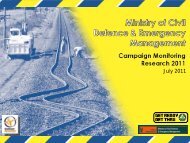Volcanoes - Ministry of Civil Defence and Emergency Management
Volcanoes - Ministry of Civil Defence and Emergency Management
Volcanoes - Ministry of Civil Defence and Emergency Management
You also want an ePaper? Increase the reach of your titles
YUMPU automatically turns print PDFs into web optimized ePapers that Google loves.
BE PREPARED<br />
There are seven active volcanic regions in New Zeal<strong>and</strong>. Those living in these regions are at risk from volcanic ash, debris <strong>and</strong> lava flows.<br />
A major eruption can deposit huge quantities <strong>of</strong> ash across vast areas creating serious problems for both urban <strong>and</strong> rural communities.<br />
We can’t prevent disasters. But each one <strong>of</strong> us can take some simple steps to ensure we will be better prepared to cope when they occur.<br />
Disasters can strike at any time <strong>and</strong> <strong>of</strong>ten without warning. Know what to do before you have to do it.<br />
AT HOME<br />
Develop a household emergency plan which includes:<br />
• Who is responsible for checking essential items in your<br />
<strong>Emergency</strong> Survival Kit<br />
• How to turn <strong>of</strong>f gas, water <strong>and</strong> electricity at the mains<br />
• How to maintain contact with each other during an emergency<br />
• How to contact your local civil defence organisation for<br />
assistance during an emergency<br />
Know the local <strong>Civil</strong> <strong>Defence</strong> warning system. If possible, know the<br />
location <strong>of</strong> your nearest <strong>Civil</strong> <strong>Defence</strong> or Community <strong>Emergency</strong><br />
Centre. It is also useful to learn First Aid <strong>and</strong> how to control small<br />
fires, <strong>and</strong> escape from a fire.<br />
IN YOUR STREET<br />
Join or form a neighbourhood support group. You <strong>and</strong> your<br />
neighbours will have skills <strong>and</strong> resources that can be vital in an<br />
emergency. Start discussing today what you can do to assist each<br />
other. Contact the Police for advice.<br />
Become a civil defence volunteer. Ask your local civil defence<br />
organisation how you can help.<br />
EMERGENCY SURVIVAL KIT<br />
If you prefer to keep your <strong>Emergency</strong> Survival Kit items in<br />
the house for everyday use, make sure you know where to<br />
find them when an emergency occurs.<br />
FOOD AND WATER – ENOUGH FOR 3 DAYS<br />
• Canned or dried food<br />
• A can opener<br />
Before an Eruption Occurs<br />
• Discover whether there are volcanic hazards likely to affect<br />
you.<br />
• If you live in an active volcanic zone, assume that you may<br />
have to deal with the effects <strong>of</strong> an eruption.<br />
• If you live in an area that could experience a lava flow<br />
during a volcanic eruption, know a quick route to safe<br />
ground.<br />
When an Eruption Threatens<br />
• If volcanologists agree that a life-threatening eruption is<br />
likely to take place, a civil defence emergency will be<br />
declared <strong>and</strong> the danger area evacuated.<br />
• Listen to your radio for information <strong>and</strong> follow civil defence<br />
advice.<br />
During an Eruption<br />
• Save water in your bath, basin containers or cylinders at an<br />
early stage – supplies may become polluted.<br />
• Stay indoors with your pets as much as possible.<br />
• Wear mask <strong>and</strong> goggles if you go outside, to keep volcanic<br />
ash out <strong>of</strong> your eyes <strong>and</strong> lungs.<br />
• Keep gutters <strong>and</strong> ro<strong>of</strong> clear <strong>of</strong> ash – heavy deposits can<br />
collapse the ro<strong>of</strong>.<br />
• Take your outdoor clothing <strong>of</strong>f before entering a building<br />
– volcanic ash is difficult to get rid <strong>of</strong>.<br />
• Take your Getaway Kit with you if you have to leave. Turn<br />
electricity <strong>and</strong> gas <strong>of</strong>f at the mains.<br />
• A primus or BBQ to cook on<br />
• Bottled water (at least 3 litres per person per day)<br />
Check <strong>and</strong> renew the food <strong>and</strong> water every 12 months.<br />
EMERGENCY ITEMS<br />
• First Aid Kit <strong>and</strong> essential medicines<br />
• Spare toilet paper/plastic rubbish bags for emergency toilet<br />
• Pet supplies<br />
• Waterpro<strong>of</strong> torches <strong>and</strong> spare batteries<br />
• Radio <strong>and</strong> spare batteries<br />
Check the batteries every three months.<br />
SUPPLIES FOR BABIES AND SMALL CHILDREN<br />
• Food <strong>and</strong> drink/clothing/favourite toy<br />
SPECIAL SUPPLIES FOR THOSE WITH DISABILITIES<br />
• Hearing aids/Mobility aids/Glasses<br />
EMERGENCY CLOTHING<br />
• Windpro<strong>of</strong> <strong>and</strong> rainpro<strong>of</strong><br />
• Sun hats<br />
• Blankets or sleeping bags<br />
• Strong shoes for outdoors<br />
Put all items, especially blankets <strong>and</strong> clothing, into leak pro<strong>of</strong><br />
plastic bags.<br />
Download your household emergency checklist from:<br />
www.civildefence.govt.nz<br />
YOUR GETAWAY KIT<br />
Everyone should have a small bag for a Getaway Kit, ready<br />
for evacuation. Most <strong>of</strong> the items are part <strong>of</strong> your <strong>Emergency</strong><br />
Survival Kit. Other items include:<br />
Family Documents<br />
• Birth/marriage certificates<br />
• Family photos<br />
• Drivers licences/passports<br />
• Insurance policies<br />
Personal Hygiene Items<br />
• Towels/soaps & toothbrushes<br />
• A change <strong>of</strong> clothes<br />
PEOPLE WITH DISABILITIES/SPECIAL NEEDS<br />
If you have a disability, make arrangements with a family<br />
member, friend, or neighbour to help you in an emergency.<br />
People with hearing impairment may not be well served by<br />
radio. Make arrangements to be sure you are informed by<br />
somebody.<br />
People with sight impairment may have difficulties if their home<br />
is disrupted <strong>and</strong> may have extra difficulties in an unfamiliar <strong>Civil</strong><br />
<strong>Defence</strong> Centre. You should arrange some form <strong>of</strong> “buddy”<br />
system.<br />
People with asthma <strong>and</strong> other respiratory disorders<br />
may be especially affected by stress, dust or volcanic<br />
ash. Have plenty <strong>of</strong> medicines <strong>and</strong> face masks in your<br />
<strong>Emergency</strong> Survival Kit.<br />
If you have special food needs, be sure to include as<br />
much as you can in your <strong>Emergency</strong> Survival Kit.<br />
www.civildefence.govt.nz



